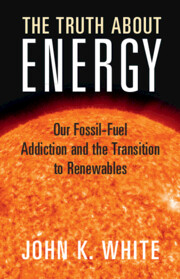
-
Select format
-
- Publisher:
- Cambridge University Press
- Publication date:
- February 2024
- February 2024
- ISBN:
- 9781009433181
- 9781009433198
- Dimensions:
- Weight & Pages:
- Dimensions:
- (229 x 152 mm)
- Weight & Pages:
- 1.05kg, 722 Pages
You may already have access via personal or institutional login
Book description
The transition to renewable energy is vital and fast-paced, but how do we choose which technologies to drive this energy transition? This timely book provides everyone interested in the renewable energy transition with an introduction to and technical foundation for understanding modern energy technology. It traces everyday power generation through history, from the Industrial Revolution to today. It examines the use of wood, coal, oil, natural gas, hydro, and nuclear to produce energy, before discussing renewable energy sources such as biomass, photovoltaics, concentrated solar power, wind, wave, and geothermal. The book examines to what extent and how each technology can contribute to a clean, green infrastructure. The Truth About Energy explains the science and engineering of energy to help everyone understand and compare current and future advances in renewable energy, providing the context to critically examine the different technologies that are competing in a fast-evolving engineering, political, and economic landscape.
Reviews
‘White's writing convincingly glides between scientific and technological descriptions of energy and the social world in which those descriptions both form, and are formed by, that same science and technology. Part expose, part explanatory guide, the book provides an excellent and balanced foundation from which to understand the transitions we must undergo in our troubled relationship to energy. The analysis is thoroughly researched and not shy about naming names as it builds upon specifics. Now thrown into crisis mode, we face extremely consequential choices - digesting this book enables the reader to understand the social consequences of energy choices.’
Kirk W. Junker - Vice Rector for Sustainability, University of Cologne
‘Written by a physicist who has done his homework - on chemistry, biology, and even some social science - this is a well-informed and engaging book that conveys the excitement the author believes we should all feel about renewable energy. For those with the interest, there is ample technological and historical background to understand the complex technologies on offer, both renewable and non-renewable. But there are also personal asides and charming juxtapositions, such as when a fusion reactor and Vincent van Gogh share space within a single paragraph. The author’s interests are wide-ranging, and despite my own background in the topics he covers, I learned a lot. I can readily see incorporating it as a supplementary text in a course in environmental studies, energy systems, or technology.’
Eric Kemp-Benedict - Associate Professor of Ecological Economics, University of Leeds
‘This book can be a valuable text/reference for discussion courses on energy at all levels … Recommended.’
J. Tavakoli Source: CHOICE
Contents
-
Introduction
pp 1-10 -
-
- You have access
- HTML
- Export citation
-
-
3 - The Nuclear World: Atoms for Peace
pp 193-296 -
-
- You have access
- HTML
- Export citation
-
Metrics
Altmetric attention score
Full text views
Full text views help Loading metrics...
Loading metrics...
* Views captured on Cambridge Core between #date#. This data will be updated every 24 hours.
Usage data cannot currently be displayed.
Accessibility standard: Unknown
Why this information is here
This section outlines the accessibility features of this content - including support for screen readers, full keyboard navigation and high-contrast display options. This may not be relevant for you.
Accessibility Information
Accessibility compliance for the PDF of this book is currently unknown and may be updated in the future.


